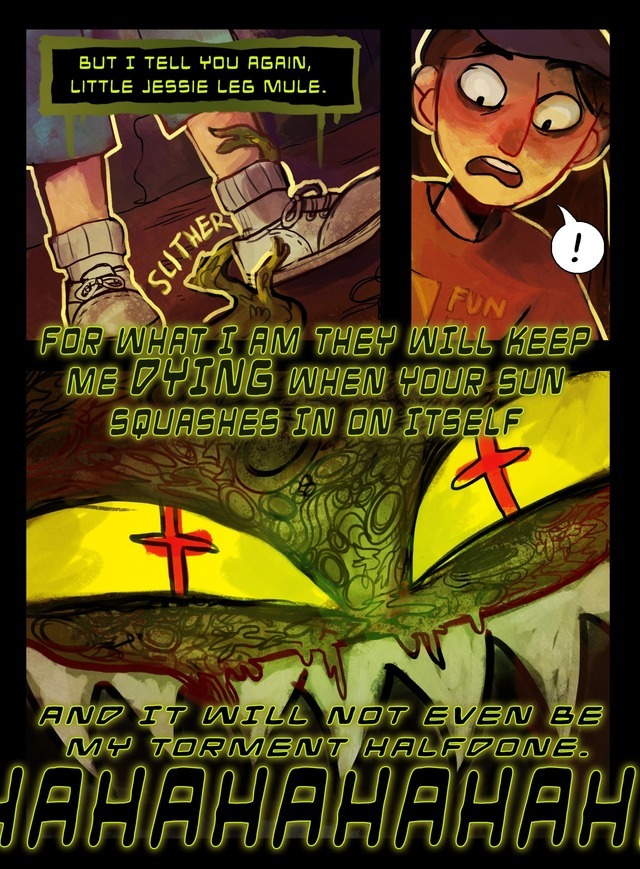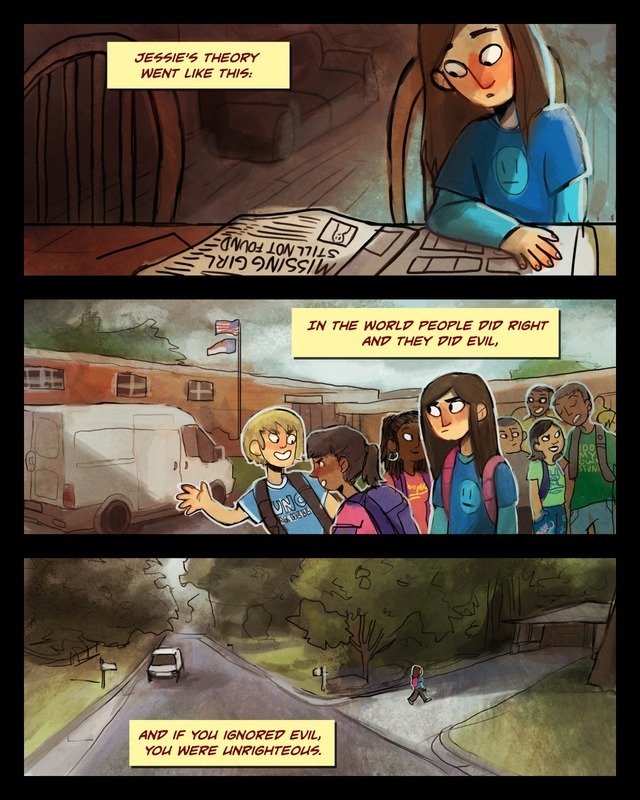Apothecia is a short (under a hundred pages), complete (as of Friday 21 November 2014) webcomic about a girl and her eldritch horror from the cold depths of space. It is written by Taz Muir and drawn by Shelby Cragg (also known for her artistic contributions to recent arcs of Homestuck).
Webcomics tend to fall into one of two categories: massive adventure epics (often never finished) or episodic sitcoms with varying degrees of continuity – so, abnormally, Apothecia has a single, focused story to tell, tells it, and then ends. It’s interesting in that it’s significantly longer than any of Emily Carroll’s short story-esque spooky one-offs and yet also significantly shorter than most known finished webcomics, such as Dawn of Time or 8-Bit Theater. When so many webcomics set out to become never-ending franchises, it’s good to see one that clearly starts out with a finite story in mind and gets straight to the point. The only thing similar in length and character that comes immediately to mind is the surreal Sin Titulo, although that had a longer gestation period.
The immediately apparent premise of the comic is this: Jessie is a lonely, parentally neglected young girl who has stumbled upon an eldritch horror-looking alien in the woods. This alien assures her he is totally wicked deadly and a destroyer of worlds and all that, but can’t seem to extricate himself from the pit she found him in, and has to subsist on Jessie’s donations of dogfood.
The art, for the most part, is very nice. Dynamic angles are used, characters are distinctive and expressive, and the artist knows when to stylise something to convey an impression rather than sticking to slavishly portraying the action. The art is rough and looks a little rushed in some areas, especially towards the end of the comic, but not in a way that detracts too badly from the experience. Cragg has a distinctive style that suits the story.

I was less enamoured with the writing. The dialogue of the eldritch horror alien dominated most of each page in the first part of the story, and it read like a mish-mash of predictable tropes about how you would expect such a creature to speak – grandiose proclamations, odd grammatical constructions, archaic wording (albeit a maddeningly inconsistent sprinkling thereof), and immense condescension to the inferior human Jessie, with added mindgames. The dialogue hits all the obvious beats – derisive, disempowering nicknames, absolute ultimatums about making a choice, etc… but it never quite develops a unique or compelling voice.
Given that the story is around seventy percent this monster and Jessie having conversations, this is a big flaw. But it’s not the comic’s biggest flaw. To discuss that, I’ll need to dip into plot spoilers, so if you’re worried about that sort of thing and ever plan on reading Apothecia, now’s the time to do it.

Click to reveal spoilers
Soylent green is made of sleds named Rosebud by Luke’s father Darth Vader who is also Tyler Durden on planet Earth all along
About halfway through the comic, Jessie, typically a tomboyish dresser, changes into a skirt and hitches a ride with a creepy guy whom she suspects of having abducted three other girls from her area. She does this in order to lure him into the woods, murder him, and feed him to the eldritch horror. All for the sake of justice, as seen through the rigid moral character we are assured Jessie possesses in all of about two pages of the comic. I get the impression that this moment is supposed to be read as a sickening inevitability, the result of a wholly rational decision made from an uncompromising moral viewpoint: Rorschach and the dogs.
But because Jessie’s moral viewpoint is barely touched on beforehand, and because it takes a careful reading of the comic to even notice the too-subtle introduction of the child abductor subplot on the page above and one other, it never quite rings true. The murder, following the right buildup, could be a very powerful scene, but without buildup it’s just there, suggesting a reaction that it doesn’t earn.
The child abductor murder subplot and the eldritch horror plot also don’t like together in any meaningful way. The child abductor is already dead by the time Jessie feeds him to her nasty pet. She makes no attempt to use the threat of becoming monster food as a way of coaxing the location of the missing girls out of the abductor, nor does she have him eaten alive as a punishment for his crimes.
In a move that just screams of forced plotting, the ultimate reason the monster escapes from its pit seems to be its ingestion of the child abductor as a ceremonial last meal, the provision of which doesn’t fit into even Jessie’s stated personality. So she unleashes the monster not just through stupidity, but through uncharacteristic stupidity.
Early on in the comic, Jessie realises that she is fully capable of just not giving the monster any more food and letting it die, maybe even covering it with some sticks and dirt first. It’s never satisfactorily explained why she doesn’t do this, or why she even started feeding it in the first place. When she articulates this to the monster it goes off on some weaksauce rant about how she has to make a choice between killing it outright or setting it free, not really convincing anyone. She seems, at the start of the comic, to have a strong compunction against killing, so this could be a motivation for not killing the monster through neglect, but there’s little sign of steady character progression or even a sudden turning point on this axiom before she’s murdering child abductors in the woods. And it’s certainly not like she likes the monster any more than she likes the child abductor.
So, in that light, the entire premise of the story is a giant plothole, and while I’m happy to ignore work-invalidating plotholes in stuff that’s otherwise good (see basically every slightly fantastic thing ever) that’s not the case here.
Apothetica is a disjointed story that brushes up against a bunch of themes but can’t quite decide which ones it wants to actually be about. It’s a plot forced onward through contrivance rather than grown naturally from character personalities. The protagonist suffers from a lack of fleshing out, and thus a lack of consistent, understandable views and motivation. The antagonist suffers from an awkward voice. The art is pleasant for the most part, and I like that it’s a finite, focused story, but otherwise there’s nothing I can recommend here.
 David Yates.
David Yates.